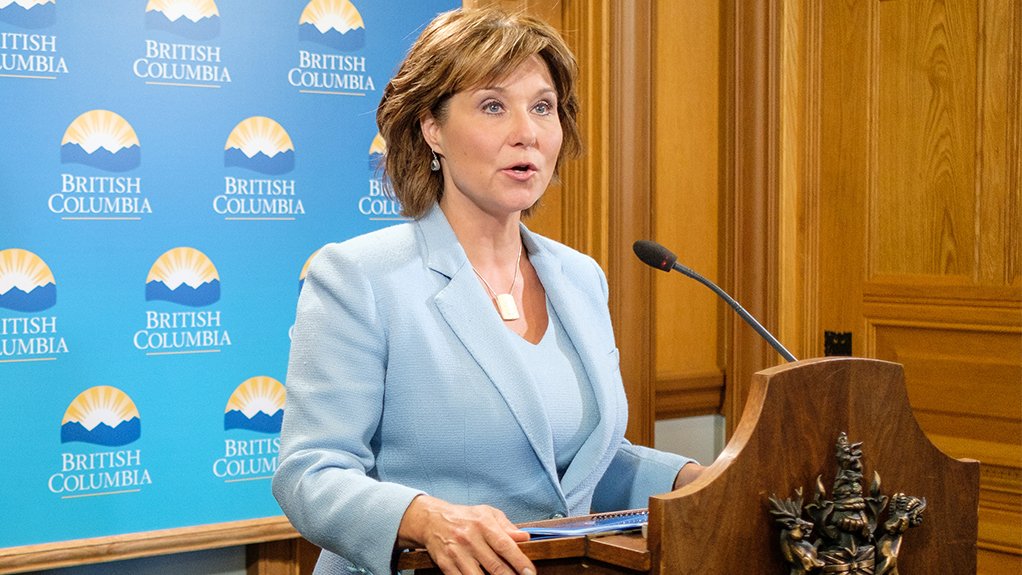VANCOUVER (miningweekly.com) – The leader of the British Columbia Liberal party Christy Clark has written a letter to Canada’s Prime Minister Justin Trudeau calling for a retaliatory ban on US thermal coal shipments through the province’s ports.
Clark, who has been the acting premier of the province since the legislative assembly was dissolved on April 11 in preparation for local elections to be held on May 9, called for federal measures in the wake of the US this week slapping duties on Canadian softwood lumber imports, a major contributor to Canada’s gross domestic product and an important input to US housing starts.
Ottawa controls the province’s ports, however, Clark stressed that “in the event that Canada does not consider this request appropriate, please be assured that British Columbia will use the tools we have at our disposal to discourage the shipping of thermal coal through British Columbia”, she said in the letter.
For many years, a high volume of US thermal coal has been shipped through British Columbia on its way to Asia. “It’s not good for the environment, but friends and trading partners cooperate. So, we haven’t pressed the issue with the federal government that regulates the port.”
US President Donald Trump’s administration levied the 20% tariffs on Canadian softwood lumber on Tuesday, sparking worries that it would decimate the province’s forest industry and forest-dependent communities.
“Clearly, the US is taking a different approach. So, I am writing you today to ban the shipment of thermal coal from BC ports,” she said.
Clark argues that banning the shipment of thermal coal would be consistent with the efforts if both British Columbia and Canada to reduce global greenhouse gas emissions.
Despite a slump in US coal output over the past several years on the back of low prices, thermal coal producers have been struggling to get their electricity-generating product to overseas markets.
CAPACITY CONSTRAINTS
Over the past five years, several proposals to build export facilities on the US West Coast have either been rejected or withdrawn, leaving insufficient export capacity.
In 2016, 6.2-million tonnes US thermal coal was exported through the Port of Vancouver. The port forecasts this volume to rise as coal demand in Asia rises and US port capacity is maintained or falls, owing to state and regional opposition.
Clark suggests that by eliminating thermal coal shipments from British Columbia’s ports, it will free up capacity for metallurgical coal that is used to make long-lasting steel, bot burned to produce short-term electricity.
Clark announced that she has written the letter to the prime minister during a site visit Wednesday to British Columbia-based business Catalyst Paper.
Catalyst made headlines when it was targeted by US rivals and the American government, and was subjected to duties. Last week, after almost two years and millions of dollars in duties and legal fees, Catalyst won its challenge as the US Department of Commerce ruled Catalyst was not receiving unfair subsidies.
“The US was wrong when it targeted Catalyst, and it’s wrong to go after BC softwood now. Every time these allegations are tested in an impartial court, they are struck down, because the facts are on our side. We’ll keep negotiating, but if we have to go back to court, we will – and we’ll win again,” Clark said in a Liberal news release.
Clark argued a ban is “in line with the values of Canada and the Cascadia region,” including US states like Oregon, Washington and California, which have also moved away from thermal coal.
According to information supplied by the Ministry of Energy and Mines, coal is British Columbia’s largest single export commodity, with 70% to 90% being metallurgical coal. In 2016, the value of coal production for British Columbia was forecast at C$3.32-billion, up 9% from 2015.
Edited by: Creamer Media Reporter
EMAIL THIS ARTICLE SAVE THIS ARTICLE
ARTICLE ENQUIRY
To subscribe email subscriptions@creamermedia.co.za or click here
To advertise email advertising@creamermedia.co.za or click here













